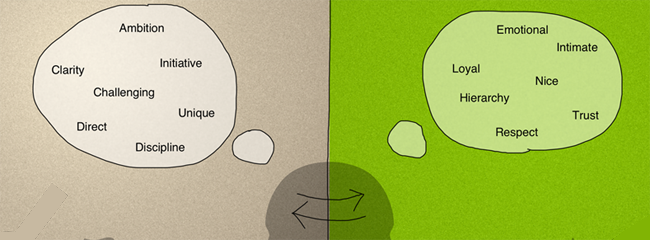The contemporary societal relevance
Present-day social mobility can only be expected to increase the number of individuals who have more than one cultural origin. This holds especially within the territory of the European Union, where free movement is facilitated by legislation affecting some four hundred million people. In the Netherlands alone, there are half a million married couples (Statistics CBS) of whom one or both of the partners were born in another country. Their children, often bilingual, are typically socialised and enculturated in both parental cultures. Other individuals may be born in one culture, but have subsequently settled down in a second, following migration. As the number of bicultural individuals increases, research on the question how bicultural individuals organise different cultural knowledge has become very timely and enjoys growing interest.
The studies on biculturalism inevitably involve two different cultures.
What research on Biculturalism examines
The theory
Bicultural individuals are considered those immigrants or expats who are well-integrated, meaning, proficient to both, their primary language/culture and that of their host society as well. Most likely thus, they have internalized dual cultural systems, namely that of their origin and that of their host society.
The Cultural Frame Switching ( CFS) theory argues that dual cultural competence enables biculturals to alternate cognition and behavior patterns dependent on which situation they find themselves. This is possible even if the two cultures contain conflicting input. Because, conflicting information cannot simultaneously guide thinking or behavior. This theory is combined with principles of activation of knowledge implemented in experimental cognitive psychology. Would thus,
“dependent on cues in the environment, cultural networks of associations rooted in the one or the other culture be activated and guide appropriately thought and behavior?”
Contrasting orientations in different societies, for example, the individualism versus collectivism one, or any other bi-polar, may not only exist between societies or minority group and mainstream within a society , but also within individuals.
We have investigated then how bicultural individuals think and behave in situations were cultural conflicting orientations apply? We needed two cultures that differ on specific domains.
The population
Cross-cultural research has concluded similarities and differences within Europe but also between North-America, Asian, Australian or African cultures. The North and South European societies also differ significantly in various domains.
The Netherlands is a highly  individualist society, while Greece was, traditionally, considered as a collectivist one (e.g., in Hofstede’s index of cultures). Although individualism is gaining pace in Greece the difference in many aspects with the Dutch society has still been found to be significant. We have studied the Dutch-Greek biculturalal mind!
individualist society, while Greece was, traditionally, considered as a collectivist one (e.g., in Hofstede’s index of cultures). Although individualism is gaining pace in Greece the difference in many aspects with the Dutch society has still been found to be significant. We have studied the Dutch-Greek biculturalal mind!
See further our specific projects and publications on:
